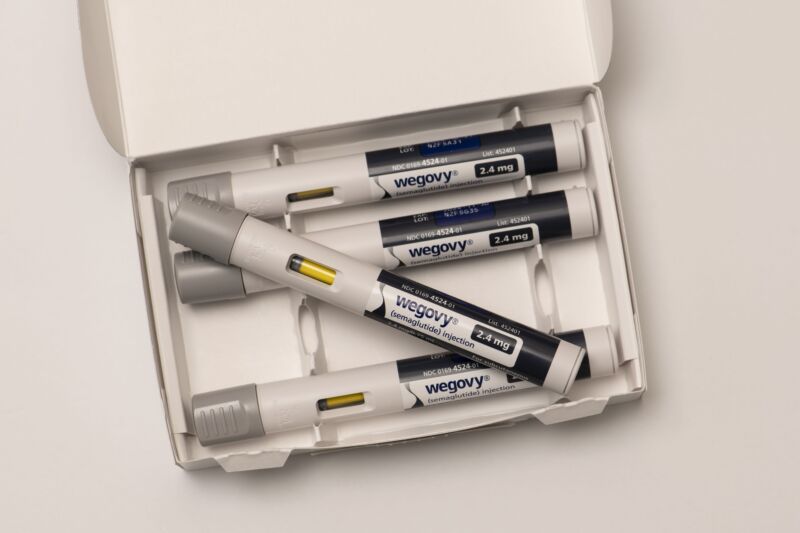Blockbuster weight-loss drugs slashed from NC state plan over ballooning costs
Patients vs. profits —
The plan spent $102M on the weight-loss drugs last year, 10% of total drug costs.

Enlarge / Wegovy is an injectable prescription weight loss medicine that has helped people with obesity.
The health plan for North Carolina state employees will stop covering blockbuster GLP-1 weight-loss drugs, including Wegovy and Zepbound, because—according to the plan’s board of trustees—the drugs are simply too expensive.
Last week, the board voted 4-3 to end all coverage of GLP-1 medications for weight loss on April 1. If the coverage is dropped, it is believed to be the first major state health plan to end coverage of the popular but pricey weight-loss drugs. The plan will continue to pay for GLP-1 medications prescribed to treat diabetes, including Ozempic.
The North Carolina State Health Plan covers nearly 740,000 people, including teachers, state employees, retirees, and their family members. In 2023, monthly premiums from the plan ranged from $25 for base coverage for an individual to up to $720 for premium family coverage. Members prescribed Wegovy paid a co-pay of between $30 and $50 per month for the drug, while the plan’s cost was around $800 a month.
In 2021, just under 2,800 members were taking the drugs for weight loss, but in 2023, the number soared to nearly 25,000 members, costing the plan $102 million. That’s about 10 percent of what the plan pays for all prescription drugs combined. If the current coverage continued, the plan’s pharmacy benefit manager, CVS Caremark, estimated that by 2025, the plan’s premiums would have to rise $48.50 across the board to offset the costs of the weight-loss drugs.
Without insurance, the list price of Wegovy is $1,349 per month, totaling $16,188 for a year of treatment. The average reported salary for members of North Carolina’s health plan is $56,431.
Last October, the board voted to grandfather the 25,000 or so current users, maintaining coverage for them moving forward, but then to stop offering new coverage to members. However, according to CVS Caremark, the move would mean losing a 40 percent rebate from Wegovy’s maker, Novo Nordisk. This would be a loss of $54 million, bringing projected 2024 costs to $139 million.
A spokesperson for Novo Nordisk called the vote to end coverage entirely “irresponsible,” according to a statement given to media. “We do not support insurers or bureaucrats inserting their judgment in these medically driven decisions,” the statement continued.
While the costs of weight-loss drugs are high everywhere, the pricing is particularly bitter for North Carolinians—Novo Nordisk manufactures Wegovy in Clayton, North Carolina, southeast of Raleigh.
“It certainly adds insult to injury,” Ardis Watkins, executive director of the State Employees Association of North Carolina, a group that lobbies on behalf of state health plan members, according to The New York Times. “Our economic climate that has been made so attractive to businesses to locate here is being used to manufacture a drug that is wildly marked up.”
While it appears to be the first time such a large state health plan has dropped coverage of the weight-loss drugs, North Carolina is not alone in wrestling with the costs. The University of Texas’ employee plan ceased coverage of Wegovy and Saxenda, another weight-loss drug, in September. Connecticut’s state health plan, meanwhile, added restrictions on how members could get a prescription covered. Some state health plans that cover GLP-1 medications for weight-loss have prior authorization procedures to try to limit use.
“Every state has been wrestling with it, every professional association that my staff is a part of has had some discussion about it,” Sam Watts, director of the North Carolina State Health Plan, told Bloomberg. “But to our knowledge, we’re the first major state health plan to act on it.”
Blockbuster weight-loss drugs slashed from NC state plan over ballooning costs Read More »
